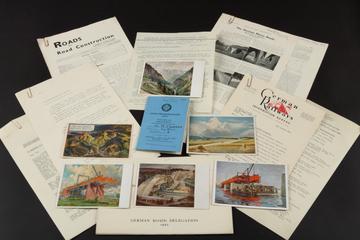
O'Gorman, Mervyn Joseph Pius 1871 - 1958
(1871-1958) Electrical and Aeronautical Engineer
Mervyn Joseph Pius O’Gorman (originally spelt Gorman but he readopted the O prefix in later life) was an electrical and aircraft engineer as well as an early advocate of the motorcar.
Born on 19th December 1871 to Edmund Anthony Gorman and Margaret Eliza Barclay Crawford in Brighton and was initially sent to Downside School. After education at University College, Dublin, he went on to study electrical engineering at the City and Guilds Central Institution and was elected as an associated member of the Institution of Mechanical Engineers in 1893.
Mervyn O’Gorman was appointed an assistant engineer at the Fowler Waring Cable Company where, following a great deal of work both in Britain and overseas, he would become first chief engineer and then general manager. Following Fowler and Waring’s acquisition by Western Electric he would leave the company to work as a consultant engineer in partnership with Edward Cozens-Hardy at a firm that did a great deal of work for both Western Electric and W.T. Glover. In 1895 he was elected an associate member of the Institution of Electrical Engineers
In 1909 he was selected by the Secretary of State for War to be the first civilian superintendent of the Royal Aircraft Factory, which would later become the Royal Aircraft Establishment. The aim of this was to introduce a scientific method and enthusiasm to the management of the site, which had previously been lacking, and to overcome some of the opposition from military traditionalists. During his period as head of the factory a system for classifying aircraft was devised based on their layout and many early aviation pioneers were employed including Geoffrey De Havilland and E.T. Busk. As an advocate of flying O’Gorman was involved in the Committee of Imperial Defence sub-committee that recommended the creation of the Royal Flying Corps in 1912 and was also involved in European aeronautics.
In 1916 the decision was taken not to continue with O’Gorman as head of the factory, as there was a great deal of controversy around the high losses sustained by the designs that were being produced at Farnborough and with many designs being seen as outdated and outclassed by newer German designs. Although he was not directly blamed for this, he was moved to the position of consulting engineer to the director-general of military aeronautics and was replaced by Henry Fowler of the Midland Railway. This would also lead to the restructuring of the RAF to focus more on research and its renaming as the Royal Aircraft Establishment. At this time, he would also be appointed as a Lieutenant Colonel in the Royal Flying Corps.
Following his removed from the Royal Aircraft Factory O’Gorman continued in what has been described as a state of semi-retirement for the rest of his life, as he would not return to a professional role in this industry. Despite this he was extremely active in a number of motoring and aeronautical bodies, including the Royal Aero Club, Royal Aeronautical Society, Royal Automobile Club and the Institute of Civil Engineers. As well as this he would continue to write numerous articles and letters on these subjects to newspapers and technical publications, following on from his 1904 work O'Gorman's Motoring Pocket Book. He would also lobby Parliament on the subject of road improvements and other similar subjects, including opposing the introduction of driving tests and speed limits. He would also be a member of the delegation that travelled to Germany in 1937 to examine the newly constructed Autobahns.
Beyond his work O’Gorman was also known for his artistic work, especially his lacquer work. He was also a keen photographer and produced some early colour images using the autochrome process. Additional, in 1933 he produced a book of poetry entitled Verses Gloomy and Gay.
Mervyn O’Gorman would die at his home in Chelsea on 16th March 1958.